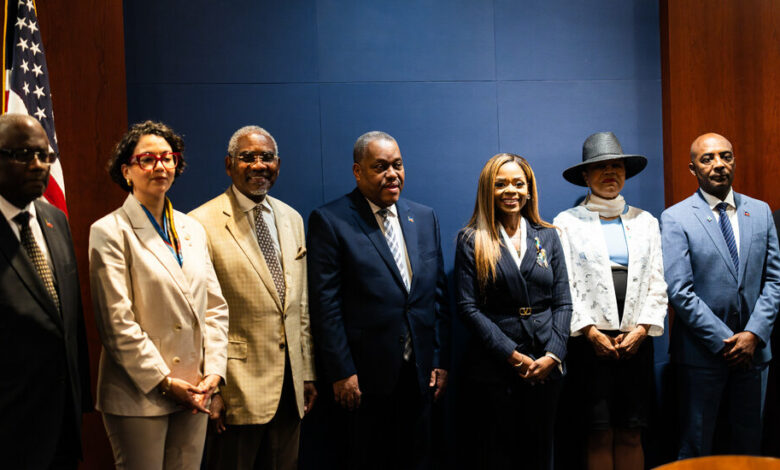New Haitian leader visits Washington seeking additional support

Leading Democrats in Congress met with Haiti’s newly installed Prime Minister Garry Conille on Tuesday and vowed to push for additional U.S. aid, days after a U.S.-backed international police mission arrived on the Caribbean island to restore stability to a country that has been under siege by criminal gangs for months.
The Biden administration plans to provide $100 million for the mission, of which the United States is the largest funder, despite Republican opposition. But Mr Conille told Democrats on Tuesday that more money would be needed, and quickly.
“This is a crucial point,” Mr. Conille said in an interview on Tuesday afternoon after meetings with lawmakers and officials at international financial institutions, expressing his appreciation for the support already pledged and stressing the urgent need for continued investment.
“I need the necessary funding to quickly implement basic infrastructure, repair basic infrastructure and ensure that services are available to people,” he said.
“The problems in Haiti are such big problems and we’re making sure that we know what his priorities are and how we can address the security needs and also the economic needs and make sure that the funding is really there,” Sheila Cherfilus-McCormick, Democrat of Florida and the only Haitian-American member of Congress, said in an interview. “We’ve been struggling here in Congress since October to make sure that the funding is there because we have a short window for success.”
Eight months after the United Nations authorized the deployment of international troops to Haiti, the first wave of troops from the Multinational Security Support Mission, led by Kenya, arrived on June 25 to try to stop the violence and regain control of the country.
In Washington, the new prime minister and members of his Cabinet also met with Biden administration officials, including Secretary of State Antony J. Blinken. At each stop, Mr. Conille, who briefly served as prime minister in 2011, detailed his plans to steer the country out of violence and corruption and restore democratic norms. The transitional government, appointed by a council, aims to hold elections before its term expires on Feb. 7, 2026.
“They’re looking forward to creating a situation where they can turn it over to a new administration, but they need help,” said Representative Gregory W. Meeks of New York, the top Democrat on the Foreign Affairs Committee. “They need resources.”
Democrats in Congress have lobbied the Biden administration to do more to support the island nation of more than 11 million people.
But funding efforts have run into a wall of opposition from senior Republicans in Congress, who say the mission’s specific goals and ways to measure success are unclear. They remain wary of pumping millions of dollars into a country controlled by gangs with a long history of political corruption.
“The Biden administration’s choice to ignore the freeze I placed on U.S. taxpayer funding for the ill-conceived Haitian MSS is deeply disappointing,” Senator Jim Risch of Idaho, the senior Republican on the Foreign Relations Committee, said in a statement, using the acronym for the international police force. “I have made my serious and specific concerns about this mission very clear since last September. My concerns exist in part because of the long history of failed international interventions in Haiti, which have wasted billions of dollars and left the Haitian people worse off.”
Joining Mr. Risch in condemning the deployment of Kenyan troops in Haiti was Representative Michael McCaul, Republican of Texas and chairman of the House Foreign Affairs Committee, who said the move had left the African country vulnerable to its own instability.
“On the same day that 400 Kenyan police officers arrived in Haiti, the Kenyan parliament was overrun by protesters,” the two Republicans said in a statement. “As a result, the Kenyan army was mobilized under suspect constitutional authority and used live ammunition to repel the protesters, killing more than 20 civilians. The government must find another solution to address insecurity in Haiti.”
The recent clashes of violence and unrest centered in Port-au-Prince, the capital, were the latest disruption of public order in a country still plagued by a series of crises.
Haitians are still recovering from a series of natural disasters, including catastrophic earthquakes in 2010 and 2021, and are grappling with food shortages, cholera outbreaks and limited access to basic health care in some parts of the country.
Instability reached new heights in 2021 when President Jovenel Moïse, elected in 2016, was assassinated in his home. No elections have been held since then and gang violence has been rampant. The United Nations estimates that nearly 80 percent of Port-au-Prince is controlled by a coalition of gangs.
Mr Meeks and Ms Cherfilus-McCormick said they were optimistic that the international police mission would succeed in putting Haiti on the path to stability.
“One of the things that I think is important, at least for me, is that the prime minister is not someone who is propped up by the United States,” Mr. Meeks said.
If Mr Conille can bring about the demise of the gangs and restore stability, “it will create a very different atmosphere on the island,” he added.
Ms Cherfilus-McCormick said she hoped a meaningful show of force against the violence would “also encourage the Haitian people to participate” in the country’s transition to a stable democracy and attract citizens back to the country.
“If we can help Haitians stay in Haiti, if we can help them thrive and develop themselves, then that becomes another country that we can engage with,” she said.
“We only have one chance here,” Mr Conille said, “and we cannot fail.”
Frans Robles contributed to the reporting.




